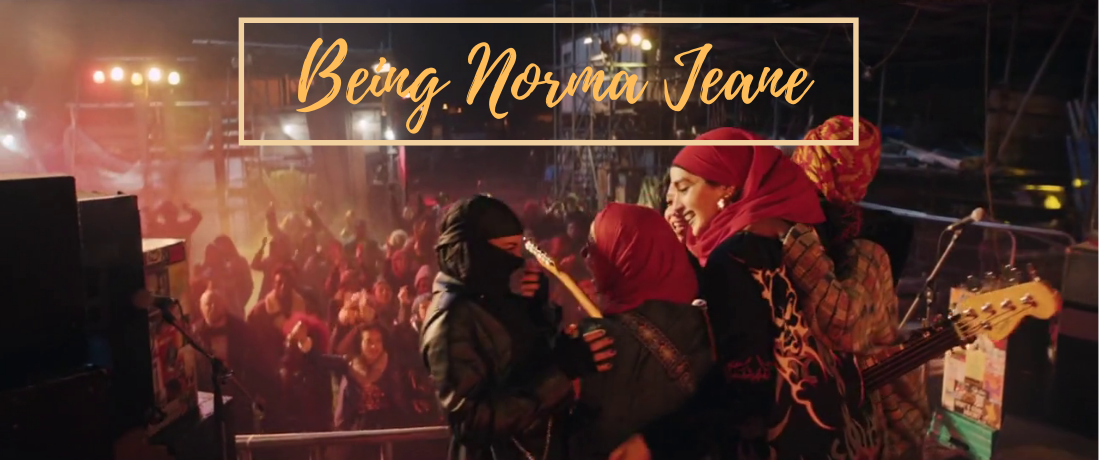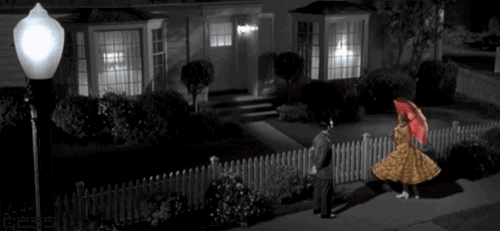There is a very favourite quote of mine which I read in this book called Jigs and Reels by Joanne Harris. The book is a collection of short stories by the author, and this particular one which the quote comes from is called Fules Gold and it's about an English teacher, who while correcting his students' essays, finds in one of the essays the last original idea. Ever. Anyways the quote goes like this, "In those days, thought Mr. Fisher, we dreamed in colour, though films were in black and white, good always triumphed in the end, and only Americans spoke American."
Now the reason I give such an introduction, which has the terms like "original idea", "colour", "black and white", "good triumphing at the end" and well, "American", because they can be used to describe the film Pleasantville. It is an old favourite of mine, one of the first films to enchant me with the idea of black and white and colour together, and as having just seen it now after quite some time, I am pretty sure it's my favourite with this concept.
(And now I am going to put some of my favourite screenshots showing this, and the review after).
Now the reason I give such an introduction, which has the terms like "original idea", "colour", "black and white", "good triumphing at the end" and well, "American", because they can be used to describe the film Pleasantville. It is an old favourite of mine, one of the first films to enchant me with the idea of black and white and colour together, and as having just seen it now after quite some time, I am pretty sure it's my favourite with this concept.
(And now I am going to put some of my favourite screenshots showing this, and the review after).
A teenager named David, who lives in the 90s, is disenchanted by the world around him. The beginning of the film shows a number of his classes where his all of his teachers are talking about how only life could get worse as time progresses. His parents are divorced and it seems like both are trying to stay as away from him as possible. Also he has a slutty twin sister Jennifer who hates him, and thinks she is from "the cool side of the uterus". David finds solace in a quintessential black and white 50s television sitcom called Pleasantville in which parents love their children, people say "swell", firemen only exist to rescue cats from trees, everyone eats hearty meals, couples sleep in separate beds promoting all the safe sex, and ofcourse, everyone is really very pleasant. David has memorised all the episodes of Pleasantville and thinks he has gotten the opportunity of his life when during a weekend-long marathon of the sit-com, there is a trivia quiz on it, allowing him to show off his expertise and win prizes for it. However Jennifer has her big date at the same time and this leads to a normal-sibling quarrel and the remote breaks. As soon as the remote breaks though, a strange TV repairman comes and seeing David's extensive knowledge on the subject of Pleasantville, gives them a special remote and goes back just as the show starts and both start fighting over the remote again. In the show the main two kids, also teenagers, Bud and Mary Sue, are fighting, just as David and Jennifer in real life. In all this struggling, the button of the remote accidentally gets pressed, and David and Jennifer then find themselves inside Pleasantville- in black and white and everything.
Once there, David decides to play along, as he already knows all the characters and what is supposed to happen to everyone. Jennifer, on the other hand, is less inclined to just walk around in a "sweater and a poodle skirt" and starts stirring things up, first by "pinning" the attractive basketball captain Skip. These changes in the normal behavior and outlook of people starts reflecting in the world around them as suddenly random things begin getting colour in them. The blank library books get filled up with literature and pictures, fire comes to life in splendid fashion, sex becomes viral and so does pop music, and the answer of "What's outside of Pleasantville?" changes from being "the beginning all over again" to "roads that just go on". David first tries to fight it, but then he sees how much this place needs colour. Ofcourse the town authorities are less pleased with it, and they try to stop the "coloureds" from taking over, as they think they are a perversion towards everything pleasant.
The film was written, produced and directed by Gary Ross. I think I am just so amazed by the concept of it all, that everything else just fades in comparison. Pleasantville is the ultimate utopia, or so David thinks so from outside the television box, but from within, he sees how wrong things are. People go throughout their lives afraid of any kind of change, but does that really make them grow? It is said that the only thing constant is change, and when that does not happen, I suppose the world gets filled with shades of black and white and grey. There is one scene in the film when Bud's employer, the soda-shop owner Bill Johnson, who is also an occasional painter, sees the art book that Bud got for him, and becomes sad thinking about how he could never paint like the greats because he will never be able to see colours like that. And then he says "Must be awful lucky to see colors like that," showing another facet of the story that we are never really happy with our own existence and keep trying to find ideal situations where we think everything will be for the better. One can look at this year's Midnight in Paris and its "Golden Age Thinking" concept for that. Yet another example from this year, which I found myself comparing Pleasantville with was Tree of Life, as we see how the whole change first affects the youth, then the mothers, and it is the fathers who seem adamant to quash it out. Many allusions occur throughout the film, which again, I think is quite clever. We see book-burning, discrimination against the "coloureds" (see: the courtroom seating and how it channels To Kill a Mockingbird), accepting sexual needs as part of nature, art becoming a voice of those who dare to differ, and how authorities never look kindly at it.
Another facet is the idolisation of the American 50s suburbia ideal. Now this one I could not connect with as much as the others, but I like the thought put behind it too. One of the best examples for this is the role of Betty Parker, Bud's and Mary Sue's mother, who looks and acts like the perfect 50s housewife, but the changes affect her quite early on in the film. Her sadness is caused due to her almost subservient existence and only being concerned with her husband and her children and the cooking, and not think about herself at all. When this feeling creeps into her, we see how she changes and how that frightens her at first, but then she becomes quite proud of her life and thinking. I think I loved her character the best in the film. She was played by the sublime Joan Allen. I mean as many teenage girls there are in the film, none of them match her beauty. She is so perfect and sad and transparent. The other one I really liked was David/Bud, who was played by Tobey Maguire. Maguire has that instant likeability about him, and though we see that this causes his character problems in the real world, he thrives in Pleasantville. I think because his character was such a dork essentially, that he knew about oppression of ideas and innovative thinking, which helps him take the drastic steps that help change all the pleasantness around. His character has an especially strong bond with that of his small-screen mother, as is depicted in a beautiful scene when he covers up the lovely colours of her face with grey makeup.
I thought Reese Witherspoon's character Jennifer/Mary Sue was really interesting. According to IMDb trivia (yes I read that), 'Mary Sue' is a name given to a female character who comes into people's lives and solves their problems. She does do that...she is the first one to challenge the routine pleasantness of the place, but we see that though it causes changes around her, there is no change in her. As David points out, "Maybe it's not just the sex," and she has one of the most interesting character developments, showing that the film doesn't promote sex as the only way to "free one's self", rather everything that is different from us and we are afraid to try out is what does the trick. I want Witherspoon to go back to these roles...she is so effortlessly bitchy and bad-ass, I love it! Then we have Jeff Daniels playing the soda-shop owner/artist Bill. This is the second time Daniels has played a fictional character with a very real side in a film I love. He is really sweet in the film, and so is William H. Macy, who plays Betty's husband George. He is so clueless about things, and his perplexity at things not going according to routine is both comical and endearing. The last person to mention is the Pleasantville Mayor Big Bob, who is the McCarthy-esque authority head, played by J.T. Walsh. At times I have thought maybe his character could have been more diabolical, but then I remembered the name of the film and shut up.
As shown and said above, I am a huge fan of the way this film looks and the inter-mixing of colours and black and white. This was done by making the whole film in colour, and then de-saturating and contrasting and so on. The sets were also spot on, portraying the perfect American 50s town, with soda shops and houses with white picket fences. The soundtrack is full of many classic oldies, but I think my favourite is right at the end, which is Fiona Apple's cover of 'Across the Universe'. Digressing here, the video of this song is set in Bill's soda shop, and is directed by P.T. Anderson, and when I found that out, my brain had like a weird spasm when I tried picturing what this film would be like if Anderson had directed it... I like it just how it is though.
I would just like to end this post by saying that Pleasantville is a brilliant film It looks and sounds gorgeous, but underneath that pretty exterior, is also a fantastic story about changes and life and how it's fine not being pleasant all the time. WATCH!!




















No comments:
Post a Comment